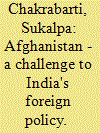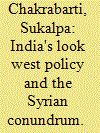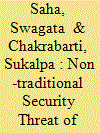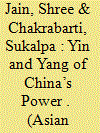|
|
|
Sort Order |
|
|
|
Items / Page
|
|
|
|
|
|
|
| Srl | Item |
| 1 |
ID:
123385


|
|
|
|
|
| Publication |
2013.
|
| Summary/Abstract |
Afghanistan has turned into one of India's most complex foreign policy challenges -with conflicting regional and extra regional players upping their stakes in the country. With barely a year left for the international community's retreat from Afghanistan, there is serious concern over the shaping up of economic, social, cultural and political trajectories therein. Finding common ground with the Taliban has become increasingly elusive and neither the Afghan army nor the political clan is showing any convincing signs of the capacity to assume responsibility for security and integrity of the country.
|
|
|
|
|
|
|
|
|
|
|
|
|
|
|
|
| 2 |
ID:
121063


|
|
|
|
|
| Publication |
2013.
|
| Summary/Abstract |
India shares historic ties with the Arab and Islamic world that cut across the spheres of culture, economy and politics. Described variously as our "extended" and "proximate" neighborhood in the diplomatic circles, the region is important for obvious strategic reasons in the fields of energy, trade, business, politics and security. The current upheaval in West Asia naturally has serious implications for India's strategic interests in the region. The unfolding of events bear the ominous possibility of a re-enactment of the Cold War politics with a vicious sectarian twist rooted in religious fundamentalism. Syria has become the current epicenter of a geopolitical showdown in the region with USA and Russia having locked horns, and the UN content to sit on the side-lines. This article would take a close look at the factors affecting and influencing India's role in Syria within the larger context of her West Asian foreign policy. It is recommended that India leads a collective diplomacy of the South to nurture and preserve a forward looking development agenda in West Asia.
|
|
|
|
|
|
|
|
|
|
|
|
|
|
|
|
| 3 |
ID:
177777


|
|
|
|
|
| Summary/Abstract |
South Asia has emerged as a major challenge in dealing with COVID-19 virus in terms of its demographics, economy, social values, political ambition and geographical location. The pandemic viewed through the prism of non-traditional security (NTS) threat presents new challenges and demands reworking of conventional governance mechanisms. India is the South Asian hegemon, and China is the single largest immediate neighbour with expansionist ambition in the region. Two most populous countries—one has been the epicentre of the virus, while the other is one of the most widely affected. Their public health and governance trajectory during the pandemic and their health diplomacy in the region have overtures for security architecture of South Asia in post-COVID-19 world. A lone statist approach and legal–institutional officialdom fail to appreciate the instrumentalities of an unconventional security threat like COVID-19. This calls for a more inclusive and comprehensive approach to deal with NTS threat, in general, and epidemiological disease, in particular. This by no means indicating a retreat of the state rather a proactive role in articulating interests of more inclusive categories and, in doing so, the state consolidates its role of governance and becomes a significant point of integration.
|
|
|
|
|
|
|
|
|
|
|
|
|
|
|
|
| 4 |
ID:
190077


|
|
|
|
|
| Summary/Abstract |
The Pew Research Center survey reports an increasing unfavorable view of China worldwide. In the Soft Power 30 index, China fares at a rank of 27th, far behind its aim of global leadership. The world’s leading economic power (in terms of purchasing power parity), a military power second only to the United States, a nation with a formidable global presence, a robust civilization and culture, however, still struggles to generate international affinity and credibility one might expect of the great middle kingdom. Acknowledging the benefits of soft power, China has continuously been engaged in the competitive politics of attraction, legitimacy, and credibility; however, Beijing’s charm offensive still has limited appeal in the outside world. The popular assessments point toward China’s authoritarian political model or poor state of civil liberties for the limited effectiveness of its soft power push. However, in this article we argue that besides the political and ideological factors limiting its soft power, China’s absolute or relative soft power gains are majorly undercut because of its coercive diplomacy exercised with the unbridled pursuit of its core national interests and hyper-nationalism. The article provides an interpretive illustration of how China’s disposition to rely on hard power instruments of carrot (inducement) and stick (threat, coercion, or intimidation) to get desired outcomes undermines the quest and effect of its soft power.
|
|
|
|
|
|
|
|
|
|
|
|
|
|
|
|
|
|
|
|
|